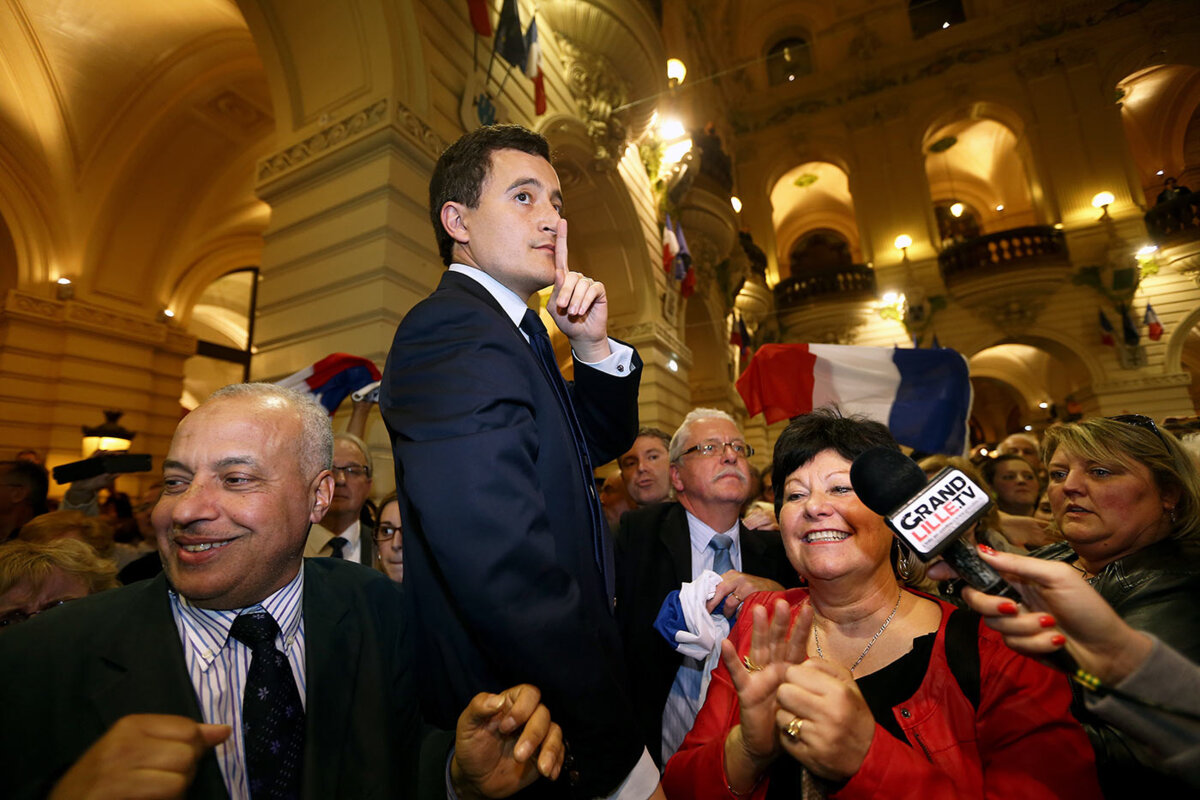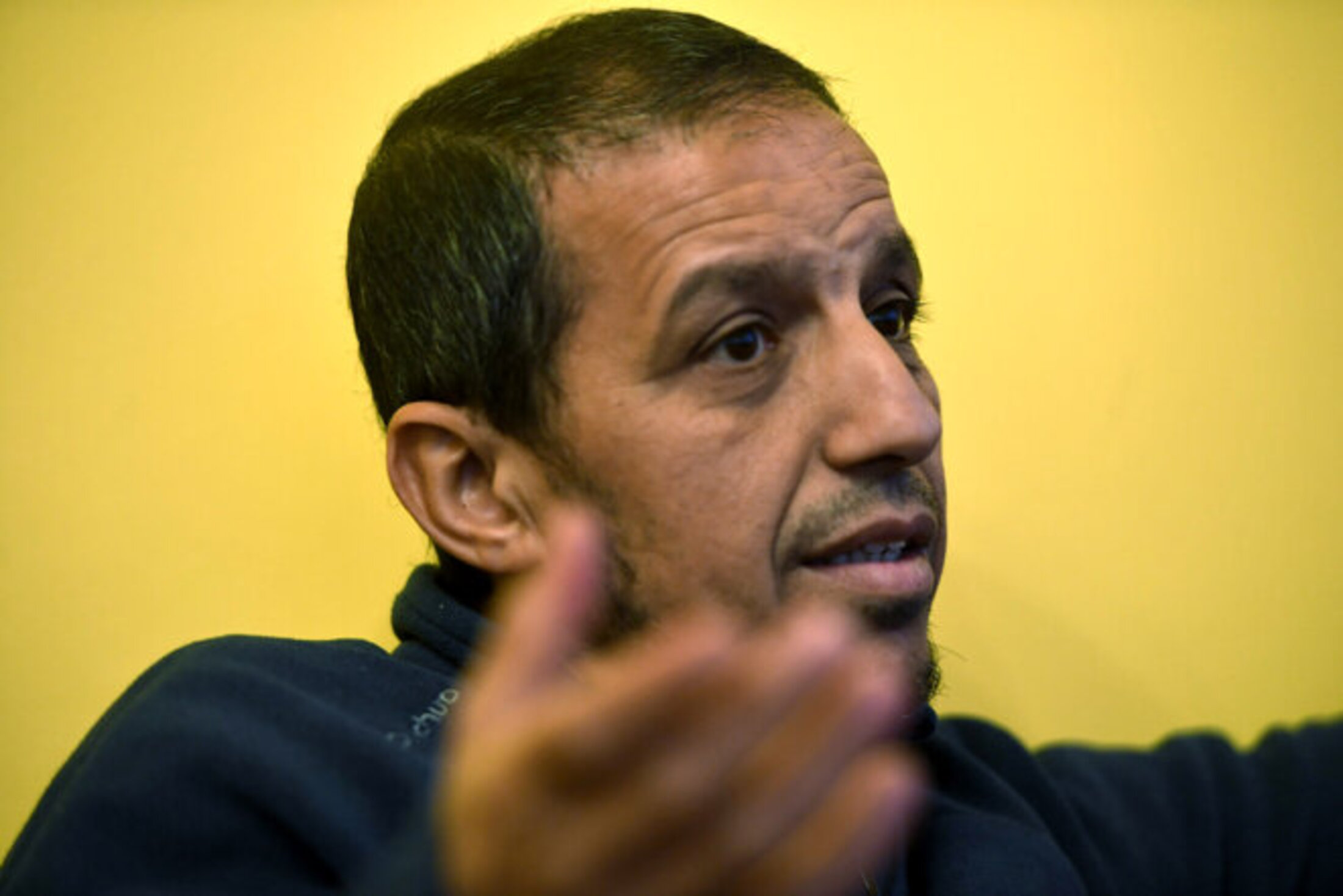France’s Council of State on Friday said it will pronounce “at the beginning of next week” on the legality of an order to deport to Morocco an imam accused of promoting anti-Semitism and opposition to gender equality, and acting as an apologist for terrorism.
The order to expel Hassan Iquioussen was signed by French interior minister Gérald Darmanin at the end of July but was overturned by a Paris administrative court in early August, prompting Darmanin to appeal that ruling before the Council of State, France’s highest court of administrative justice.
The case has become a major cause for the controversial hardline interior minister, who has embarked on a series of virulent attacks against Iquioussen in media interviews, describing the preacher as “an enemy of the republic” who makes “anti-Semitic comments”, who “denies genocides” and “denies the equality between women and men”. Darmanin has already announced that if the Council of State rules against his expulsion order, he will counter that with proposed legislation “to further protect the French [people]”.
But Mediapart can now reveal that Darmanin had previously courted Iquioussen’s support during his campaign to become mayor of the north-east French town of Tourcoing. This notably included a discrete dinner meeting with the imam and his son, along with other influential members of the local Muslim community, which Iquioussen described as being a “very lovely evening”, and which neither Darmanin nor his ministry have mentioned publicly.

Enlargement : Illustration 1

The Council of State began its deliberations on Friday with a hearing lasting almost three hours, when Iquioussen’s lawyer, Lucie Simon, and a representative of the French interior ministry, Pascale Léglise, pitched their opposing arguments.
Léglise told the hearing that Iquioussen, 58, had a large following “increased tenfold by social media” with which he spread “insidious ideas”, adding she had “spent my summer” examining videos of his speeches and comments. “Why expel him now?” she asked, “Because now the fire has been lit with this kind of speech which leads to legitimising terrorist attacks and separatism” – a word coined by President Emmanuel Macron when promoting legislation introduced last year to crack down on “Islamist separatism” .
Iquioussen’s lawyer argued that the imam did not constitute any “serious and current” threat to France, and that the quotes from the imam cited by the interior ministry, which she said were sometimes “distorted”, did not meet the “explicit and deliberate” provocation required by law for his deportation. She underlined that Iquioussen was born – and has spent all his life – in France, and has no particular connections within Morocco, where he has never lived.
Iquioussen, the father of five children, and 15 grandchildren, all French nationals, holds Moroccan nationality through his father and lost his dual French citizenship at the age of 18, reportedly at his own behest.
The order to expel Iquioussen was overturned on August 5th, after the imam challenged the move before a Paris administrative court. While critical of Iquioussen’s past declarations, some of which he has since retracted, the court ruled that the move to deport him was based on insufficient grounds and was a “disproportionate” infringement of his “right to a private and family life”, as guaranteed by the European Court of Human Rights by criteria that are met by the existence of his French children and grandchildren.

Enlargement : Illustration 2

In a tweet in July, Darmanin declared: “This preacher has for years been speaking hatefully against the values of France, contrary to our principles of secularity and equality between women and men.” Mediapart can reveal that he and Iquioussen enjoyed cordial relations when Darmanin was campaigning in 2014 for his election as mayor of the north-east French town of Tourcoing, which he eventually won.
During that campaign, Iquioussen, from the same north-east region, met with Darmanin for a dinner at a private address in the Gambetta district of Tourcoing, along with his son and a small group of other individuals from the local Muslim community. Darmanin’s aim was to woo the Muslim vote in the town, and notably through the influence wielded by Iquioussen.
Darmanin, 39, did not respond to questions submitted to him by Mediapart about the circumstances of the meeting and the subjects of conversation.
According to witnesses questioned by Mediapart, the dinner, which until now has remained secret, was convivial and lasted about two hours.
Hassan Iquioussen, speaking to Mediapart by phone, recalled a pleasant evening. “We had a very lovely evening,” he said. “It was very positive, we agreed on ninety-nine-point-nine percent of the topics of conversation.”
Mediapart has traced two other people present at the dinner who recalled, both orally and in writing, the discrete event. One of them, Mounir (whose real identity is withheld here), an engineer from the north-east region, said he was sitting close to Darmanin. “The atmosphere was cordial,” he recalled. “There were neither tough exchanges nor even contradictory debates. It was constructive.”
Darmanin was then a member of the French conservative party, the UMP, now renamed as Les Républicains (he jumped ship to join Emmanuel Macron’s centre-right LREM party shortly before Macron’s election as president). At the time, the UMP had bridged political relations with the Union of Islamic Organisations of France (UOIF), close to the Muslim Brotherhood (and now renamed Muslims of France). Iquioussen was a star speaker at the UOIF’s annual congresses at Le Bourget, close to Paris, alongside the once prominent but now disgraced Islamic intellectual, scholar and preacher Tariq Ramadan.
In 2013, the UOIF called on Muslims to join in demonstrations against the socialist government’s draft legislation to legalise same-sex marriage, and which became law in May that year. When, on March 24th 2013, Gérald Darmanin joined in one of the protest marches – mostly driven by Catholic groups and which had the backing of his UMP party – UOIF militants had for two months already been present in the regular demonstrations carrying banners in both French and Arabic.
Darmanin, then aged 30, was already preparing his bid to become mayor of Tourcoing. He had publicly argued that his political mentor, former French president Nicolas Sarkozy, lost his re-election bid in 2012 because the Muslim electorate had voted massively for his socialist rival François Hollande. But Darmanin was convinced that Muslims were largely a conservative-minded community. He was interviewed by political scientist and Arabist Gilles Kepel for the latter’s 2014 book Passion française, in which Darmanin is quoted as saying: “They have an often ‘reactionary’ viewpoint in fact (laughter), in any case much more so than Catholics.”
On June 2nd 2013, Darmanin tweeted: “If I am mayor of Tourcoing, I will not myself celebrate marriages between two men and two women.” Like many of his conservative colleagues at the time, he was counting on attracting a supposed Muslim vote in his bid to gain control of the Tourcoing town hall which had been run by the socialists for almost a century.
Active in the local UMP party structure since the early 2000s, Darmanin had risen through its ranks to become elected, in June 2012, as the party’s MP for the constituency that includes Tourcoing. Salim Achiba, a chartered accountant and a key figure in the local Muslim community, soon rallied behind him. Achiba had good contacts among local Muslim associations and was a regular presence at the town’s mosques during Friday prayers and festivities.
“It was him [Achiba] who made Darmanin respectable in the eyes of the Muslim community,” commented Amine El Bahi, a militant with the conservative Les Républicains party (the former UMP) from the nearby town of Roubaix. “I have respect for him.”
Imam Hassan Iquioussen also has respect for Achiba, who he says he became friends with when he preached on the campus of the Villeneuve-d’Ascq university, situated close to Tourcoing and Roubaix, where Achiba was once a student. “Mr Achiba took part in my conferences in a regular manner,” said Iquioussen.
It was Achiba who organised the 2014 dinner between Darmanin and local Muslims, including Iquioussen and his son, during his campaigning to become mayor of Tourcoing. Achiba provided an apartment for the purpose, situated in a large converted townhouse property, and also looked after the menu, which consisted of pizzas, according to first-hand accounts.
Yanis (whose true identity is withheld here), was one of the guests. “Hassan Iquioussen arrived a little late, with his son,” he recalled. “Salim Achiba was the first to speak. He presented Gérald Darmanin, who then explained why he wanted to become mayor of Tourcoing.”
He said that after all those present had spoken up, the discussions led Darmanin into explaining his position on the same-sex marriage law. “Darmanin made a point of honour of underlining that he had the middle name of Moussa, and that this came from his grandfather,” recalled Yanis (Darmanin’s maternal grandfather was from Algeria). “He said, ‘We share certain opinions. You, the Muslims, you don’t approve of homosexual marriage. We have that same line’.”
Mounir, the other person present who Mediapart spoke to (cited further above), said he especially remembers “discussions about the capacity of Muslim populations to go to the polling stations”.
When asked about his subsequent role in Darmanin’s election campaign, Iquioussen insisted he had not called for people to vote for the candidate. But he said he had maintained excellent relations with Salim Achiba, who became Darmanin’s right-hand man at Tourcoing town hall, and that just several months ago, after he was refused the renewal of his residence permit, he had sought Achiba’s mediation.
“I ate his salt, as the Arabs say,” added Iquioussen, referring to an Arabic phrase that means one has accepted another’s hospitality. “When someone invites you, when he opens the door to his place, and he shares a meal with you, that means that to his eyes you have importance and merit.”
At the time of the dinner, could Gérard Darmanin have been unaware of the controversy that already surrounded the imam? Neither he nor Salim Achiba responded to that question, submitted to them by Mediapart.
In fact, Iquioussen’s injurious statements were known and reported in the press before that period. As far back as 2004, French dailies L’Humanité and Le Figaro revealed comments he made during an anti-Semitic conference entitled “Palestine, a story of injustice”. In video tapes of the event, which were distributed in some Islamic bookshops in France, he described Jews as “miserly” and “usurers”, “ungrateful”, and “living between each other in ghettos”, and that “the Jews connived with Hitler” in order to force a move to Palestine.
-------------------------
If you have information of public interest you would like to pass on to Mediapart for investigation you can contact us at this email address: enquete@mediapart.fr. If you wish to send us documents for our scrutiny via our highly secure platform please go to https://www.frenchleaks.fr/ which is presented in both English and French.
-------------------------
- This article is based on a report that can be found in its original French version here, and includes extracts from another report in French which is available here.
English version by Graham Tearse


